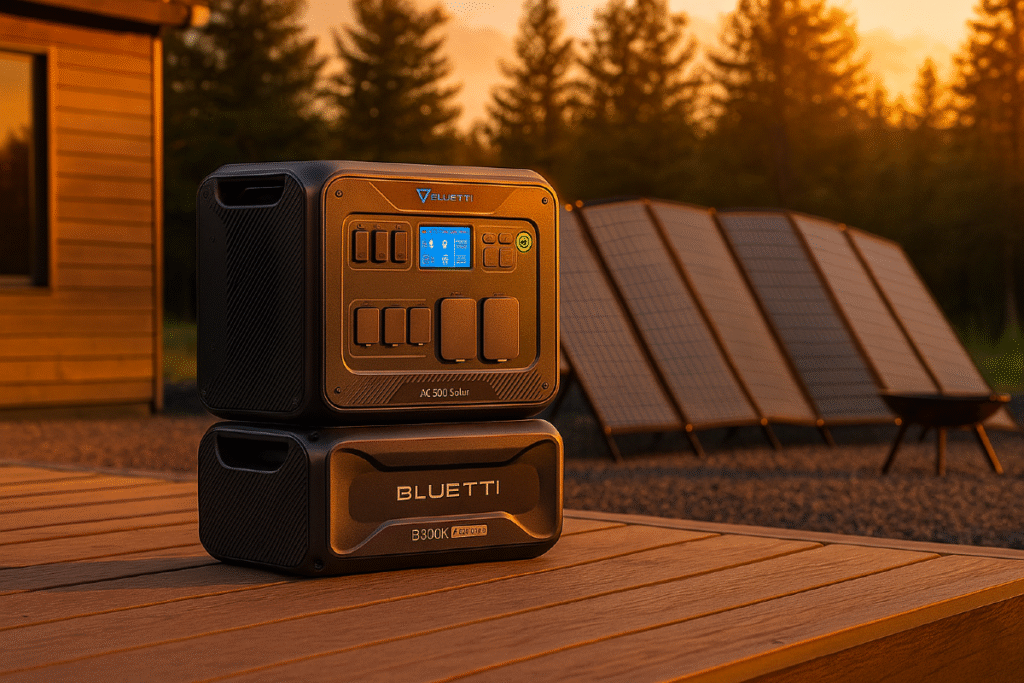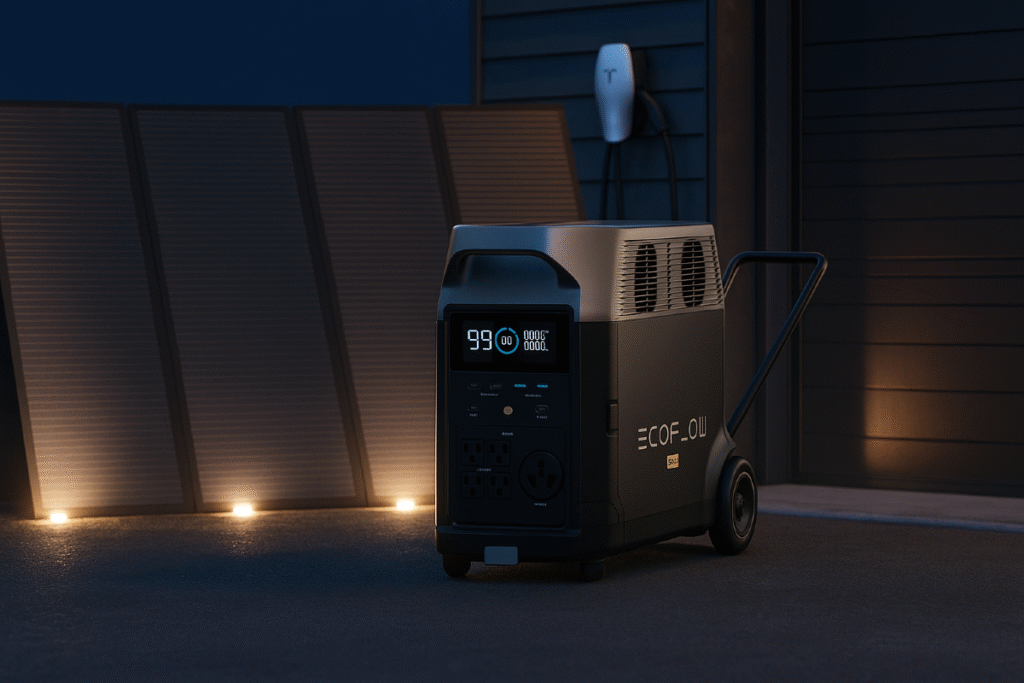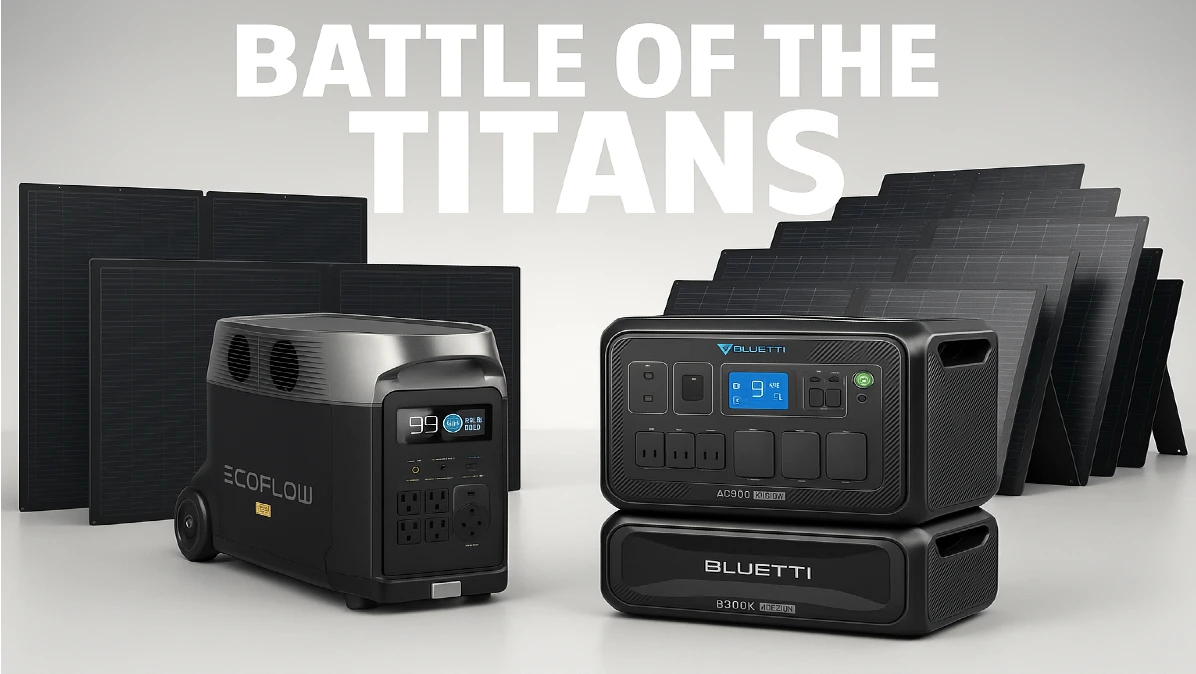Which Solar Generator Truly Powers Your Life Off the Grid?
When it comes to home backup power, off-grid resilience, or prepping for blackouts, Bluetti vs EcoFlow is one of the most searched and debated comparisons in 2025. Both brands offer cutting-edge solar generators, but which one actually delivers more value, power, and reliability for the modern homeowner?
As solar technology matures and grid instability increases, users are turning away from noisy gas generators and embracing clean, expandable energy systems. In this detailed guide, we’ll break down how the Bluetti AC500 with B300K battery stacks up against the sleek and scalable EcoFlow Delta Pro solar generator.
We’ll compare their real-world performance, expandability, power output, smart features, and solar charging efficiency — with insights from actual users and guidance from energy.gov and FEMA for informed decision-making.
Power Output Faceoff: Bluetti vs EcoFlow

When evaluating Bluetti vs EcoFlow, power output is where the rubber meets the road. The Bluetti AC500 delivers a powerful 5,000W continuous output and a surge capacity of 10,000W, making it ideal for heavy-duty appliances, power tools, and whole-home coverage.
On the flip side, the EcoFlow Delta Pro provides 3,600W continuous output with a surge capacity of up to 7,200W using its proprietary X-Boost tech. While it trails Bluetti slightly in raw wattage, it’s more than capable of handling essentials like refrigerators, sump pumps, CPAP machines, and even small air conditioners.
Both units support pure sine wave output, which is critical for sensitive electronics and medical devices. If you’re running a high-demand setup—think furnace, deep freezer, and well pump—Bluetti may offer a bit more breathing room. However, EcoFlow shines in energy efficiency and flexibility under load, especially when paired with its app-driven management system.
Battery Chemistry and Life Cycle Comparison
One of the most overlooked aspects in the Bluetti vs EcoFlow debate is battery longevity. Both units use LiFePO₄ (Lithium Iron Phosphate) battery chemistry, widely praised for its safety, thermal stability, and long cycle life.
The Bluetti AC500 with B300K offers over 3,500 charge cycles before capacity degrades to 80%, and EcoFlow claims the same 3,500+ cycle durability for the Delta Pro. This puts both generators on equal footing when it comes to long-term use — expect up to a decade of regular performance under proper conditions.
Additionally, LiFePO₄ batteries resist overheating and are less prone to fire hazards than lithium-ion alternatives. That makes them a top choice for indoor use and extended deployments. For preppers, families, and RV owners, this chemistry provides not just performance — but peace of mind.
Solar Charging and Efficiency: Bluetti vs EcoFlow
One of the most common questions in the Bluetti vs EcoFlow comparison is: which system charges faster and more efficiently from the sun? The answer depends on both panel quality and the maximum solar input each generator supports.
The Bluetti AC500 accepts up to 3,000W of solar input thanks to its dual MPPT controllers. That means with enough solar panels—like Bluetti’s 4×200W setup—you can recharge the unit in as little as 2 hours under optimal sunlight.
Meanwhile, the EcoFlow Delta Pro allows up to 1,600W of solar charging, which typically translates to 3.5–6 hours with its 2×400W panels. EcoFlow compensates for the lower input with highly efficient monocrystalline panels (23% efficiency) and the option to combine solar with AC input for rapid dual charging.
For those relying heavily on solar—such as off-grid cabins or RV setups—Bluetti has the upper hand with higher solar throughput. But for urban dwellers or weekend campers, EcoFlow’s hybrid charging and compact panel system may be easier to deploy.
Expandability and Modular Design

In a head-to-head between Bluetti vs EcoFlow, expandability is a deciding factor for many users. Both systems support modular expansion, but they go about it differently.
The Bluetti AC500 can connect up to six B300K battery modules, pushing total capacity to a massive 16,588Wh. It’s a plug-and-play system, making it ideal for whole-home backup or long-term off-grid installations. The stackable design also keeps your setup organized and scalable.
EcoFlow’s Delta Pro, on the other hand, can be expanded up to 25kWh with additional Smart Batteries and integrated directly with the EcoFlow Smart Home Panel. This enables automatic switchover during outages and remote monitoring via the EcoFlow app.
If you plan to scale your power system over time or integrate with home electrical panels, EcoFlow offers slightly more seamless smart-home functionality. But if you want raw battery capacity with maximum wattage support, Bluetti’s modular design is hard to beat.
Portability and Build Quality: Bluetti vs EcoFlow
Portability is a big factor in the Bluetti vs EcoFlow showdown, especially for RV users, campers, and anyone who needs mobile power. The Bluetti AC500 and B300K combo weighs around 130 pounds combined, which makes it quite heavy but not unmanageable with two people. Its rugged handles and stackable form factor help during transport and storage.
By contrast, the EcoFlow Delta Pro weighs about 99 pounds and includes built-in wheels and a telescoping luggage-style handle, making it much easier to maneuver single-handedly. If you’re planning to move the generator regularly or keep it in an RV, EcoFlow wins hands down in this department.
Both units are housed in high-impact, weather-resistant plastic, built to handle rough environments and transport bumps. EcoFlow’s modern aesthetic gives it an edge in appearance, while Bluetti’s industrial design emphasizes durability. For long-term reliability, both units are well-constructed and field-tested.
Smart App Control and Monitoring
Tech-savvy buyers often prioritize remote control and monitoring features — and that’s where Bluetti vs EcoFlow becomes even more interesting. Both brands offer companion apps, but their functionality varies in depth and polish.
The EcoFlow Delta Pro offers one of the most refined app experiences on the market. The EcoFlow app lets you monitor real-time energy flow, toggle ports, view battery health, adjust charging speeds, and even set automatic start/stop schedules. It connects via Bluetooth or Wi-Fi and integrates with EcoFlow’s Smart Home Panel for seamless energy automation.
On the other hand, Bluetti’s app supports Bluetooth and Wi-Fi as well, offering remote status checks, firmware updates, and basic control over output ports. While functional, it lacks some of the deeper customization and smart-home integrations found in EcoFlow’s ecosystem.
For users who prefer a “set it and forget it” model, either will suffice. But if you’re a control freak or data enthusiast, EcoFlow’s app offers a more polished and feature-rich experience.
Noise Levels and Indoor Use: Bluetti vs EcoFlow
One of the biggest advantages of solar generators over gas-powered units is their quiet operation. In the Bluetti vs EcoFlow matchup, both systems offer near-silent performance, making them perfect for indoor or overnight use.
The Bluetti AC500 operates silently under normal load, with only a mild hum when the fans kick in during heavy discharge or charging. Most users report no disruption to daily activities, even when running the unit inside a home or RV.
The EcoFlow Delta Pro is even quieter — producing less than 30 decibels of noise at idle, which is comparable to a whisper or the sound of a desktop fan. That makes it ideal for bedrooms, basements, or quiet cabins where noise pollution is a dealbreaker.
Both units also emit zero fumes and require no ventilation, unlike traditional generators. This makes them safe for indoor use, provided you follow proper safety practices like avoiding overloading or using near flammable materials.
Ease of Installation and Integration
Ease of setup is another hot topic in the Bluetti vs EcoFlow debate. Both products are plug-and-play out of the box, but if you’re aiming for whole-home backup, installation complexity varies.
The Bluetti AC500 system can be configured with a manual transfer switch for powering essential home circuits like refrigerators, lighting, and sump pumps. Most users report setup takes under 30 minutes once everything is unboxed, though installing a transfer switch may require an electrician.
EcoFlow’s Delta Pro goes a step further with its optional Smart Home Panel, which allows for automated switchover during outages and supports up to 10 circuits. The panel requires professional installation, but offers a seamless integration with your home’s power system, complete with app automation and scheduling features.
For DIYers, both systems can be used without touching the main breaker box. Just plug in devices directly or use heavy-duty extension cords. But if you want a clean, permanent, and professional backup setup, EcoFlow’s infrastructure is slightly more advanced.
Real-World User Reviews: Bluetti vs EcoFlow
User feedback is invaluable in determining whether Bluetti vs EcoFlow is the better fit for your needs. Thankfully, both brands receive strong praise from verified buyers across the board.
Bluetti AC500 owners love its rugged build, high power output, and scalable design. Many reviewers use it for entire-home backup and highlight its ability to handle 240V appliances with multiple battery modules. Some note its weight as a downside but praise the performance once installed. As one user stated: “We powered our fridge, furnace, and lights through a 3-day storm — zero issues.”
EcoFlow Delta Pro users rave about its portability, intuitive app, and quiet operation. It’s especially popular among those with limited space or who move their system between home and RV. Customers report smooth performance during outages and appreciate the fast recharge options. One homeowner shared: “We replaced our gas generator with the Delta Pro and slept peacefully through every outage since.”
Negative reviews for both systems are rare but include concerns about solar performance under cloudy conditions, the need for add-ons to unlock full features, and customer service delays during peak seasons. Still, the vast majority of users find either system a reliable long-term solution.
Value for Money and Pricing Analysis
In the world of solar generators, pricing often reflects both raw specs and long-term flexibility. So, which system offers the best value in the Bluetti vs EcoFlow comparison?
Both the Bluetti AC500 with B300K and the EcoFlow Delta Pro are currently priced around $2,899 — and each includes generous promotional bundles with solar panels, accessories, or interest-free payment plans.
Bluetti delivers more raw power (5,000W vs 3,600W), larger surge capacity, and greater solar input — making it ideal for power users and full-home backup needs. Meanwhile, EcoFlow includes a more polished app, seamless smart-home integration, and better out-of-the-box mobility, giving it the edge for tech-savvy users and flexible living setups.
In short: Bluetti provides more watts per dollar, while EcoFlow delivers more features per watt. If you’re prioritizing brute strength and expandability, Bluetti may be the better deal. But if ease of use, rapid charging, and smart automation top your list, EcoFlow is worth every penny.
Warranty, Support, and Brand Trust: Bluetti vs EcoFlow
Buying a solar generator is a long-term investment, so warranty and customer support can’t be overlooked in the Bluetti vs EcoFlow conversation.
Bluetti offers a 4-year warranty on the AC500 and B300K, covering product defects and battery degradation within standard usage. Their lifetime technical support is often praised in reviews, though some users have reported slow response times during peak seasons.
EcoFlow provides a slightly longer 5-year warranty on the Delta Pro, which includes battery performance and hardware reliability. Their support team is accessible through chat, phone, and email, and reviews suggest faster issue resolution—particularly for replacement parts or shipping claims.
Both brands are known in the renewable tech space and have rapidly growing communities of users online. EcoFlow’s aggressive R&D cycle and regular firmware updates give it an edge in innovation. Bluetti, on the other hand, has carved out a reputation for building “tanks”—products that last and perform under extreme conditions.
Who Should Choose Bluetti vs EcoFlow?
Now let’s answer the big question: who wins the Bluetti vs EcoFlow battle for your specific needs?
Choose Bluetti if you:
- Need maximum output for power-hungry tools or appliances
- Prefer to expand with more battery modules over time
- Want the best solar input for true off-grid capability
- Plan to install a permanent or semi-permanent backup system
Choose EcoFlow if you:
- Value fast setup and all-in-one smart control
- Move your generator often between home, RV, or job sites
- Want polished app control and 240V expandability
- Prefer a lightweight, mobile solution with quick recharge times
Ultimately, the best solar generator depends on how and where you plan to use it. Both systems are top-tier, and your personal priorities—power, mobility, intelligence, or value—will guide the right pick.
Bluetti vs EcoFlow Final Verdict
When comparing Bluetti vs EcoFlow, you’re really choosing between two industry-leading solutions for portable and backup power in 2025. Both offer premium features, outstanding reliability, and room to grow—but they cater to slightly different lifestyles.
Bluetti AC500 excels in raw power, solar capability, and scalable storage. It’s the better fit for homeowners looking to build a true off-grid or full-home backup solution without the noise or fumes of gas generators.
EcoFlow Delta Pro stands out for its modern smart features, app control, portability, and fast multi-input charging. It’s perfect for people who need flexible, intelligent, and quiet energy solutions—whether for emergencies, travel, or daily use.
At the end of the day, there’s no wrong choice—only the better choice for your unique situation. Whether you go with Bluetti’s raw capacity or EcoFlow’s tech-driven flexibility, you’ll be investing in energy independence and peace of mind for years to come.
FAQs About Bluetti vs EcoFlow
Which solar generator has more power output?
The Bluetti AC500 offers up to 5,000W output with a 10,000W surge capacity. EcoFlow’s Delta Pro provides 3,600W with 7,200W surge. Bluetti wins in raw wattage.
Which one charges faster with solar?
Bluetti accepts up to 3,000W solar input, while EcoFlow maxes out at 1,600W. In good sun, Bluetti recharges faster—though EcoFlow compensates with dual-input options for hybrid charging.
Can either run a whole house?
Yes. Both systems are expandable and can support 240V appliances. With additional batteries and transfer switches, either can power essential circuits or even entire homes.
Which app is better: Bluetti or EcoFlow?
EcoFlow’s app is more advanced, offering remote control, detailed power flow monitoring, firmware updates, and integration with smart panels. Bluetti’s app is simpler but effective.
Which is more portable?
EcoFlow is lighter and comes with wheels and a retractable handle, making it easier to move. Bluetti is heavier and better suited for stationary use or planned relocations.
Are both systems safe for indoor use?
Yes. Both generators use LiFePO₄ batteries, emit no fumes, and operate quietly—making them safe and ideal for indoor backup power during outages.
Related Articles You Might Like
In-Depth Reviews of Each Generator
- Bluetti AC500 B300K Review: 2025’s Best Solar Generator? – Explore a full breakdown of Bluetti’s performance, capacity, solar input, and use cases in this expert review.
- EcoFlow Delta Pro Ultra: What Makes It a Game-Changer? – Discover how EcoFlow’s flagship model revolutionizes smart power, modular expansion, and full-home backup.
- Best Solar Generators for Home Backup – Explore top-rated options for powering your house during blackouts, storms, and grid failures.
- Best Solar Generators for Camping – Discover lightweight, portable power stations perfect for RVs, tents, and off-grid adventures.

